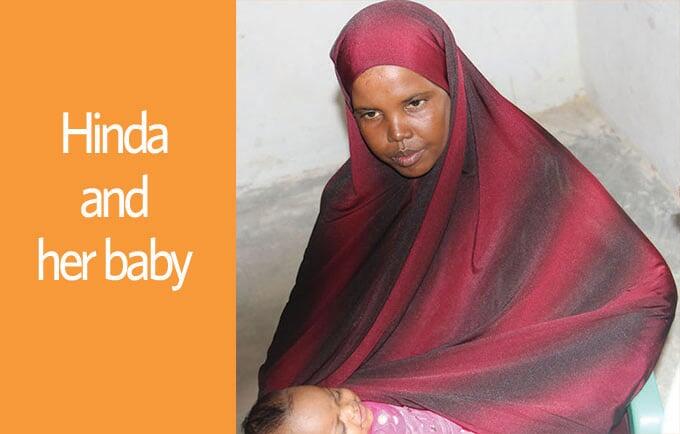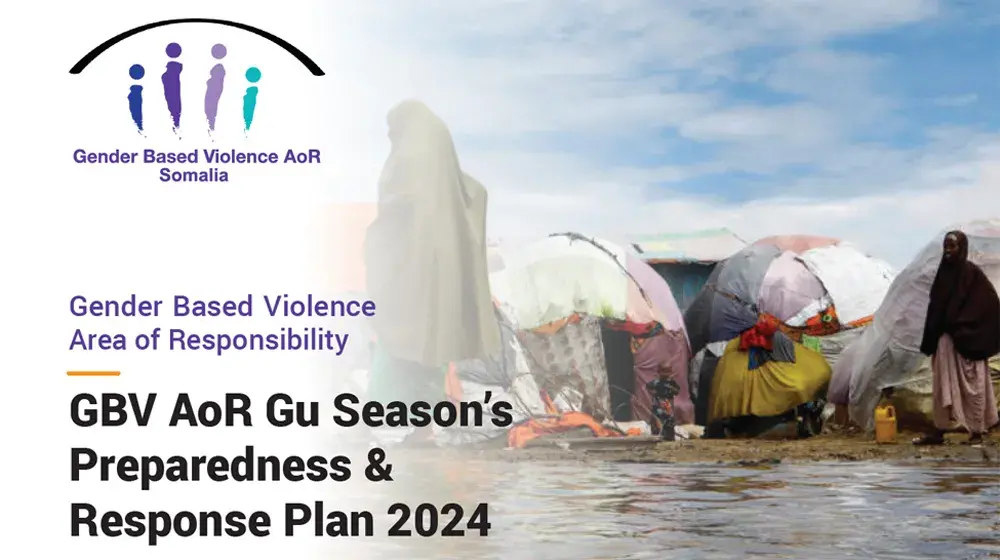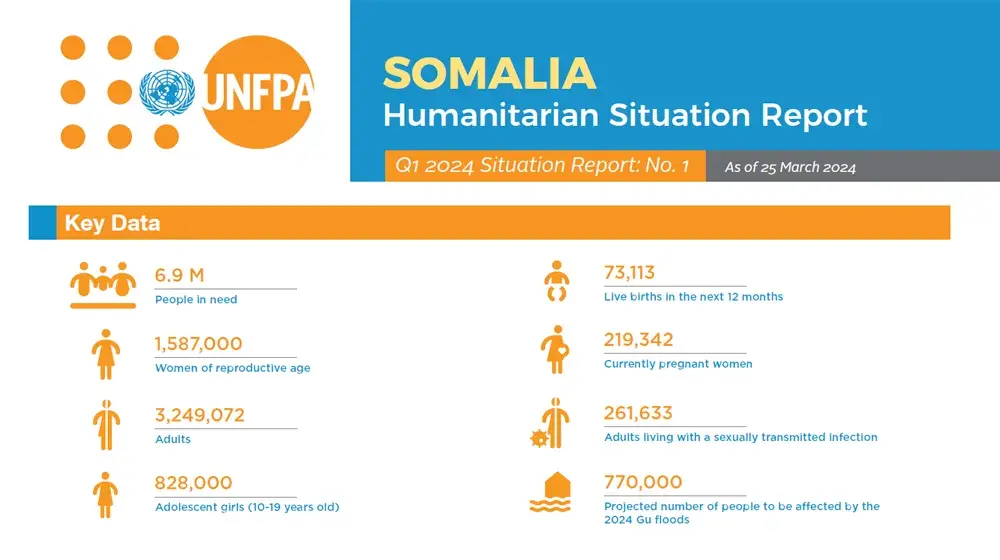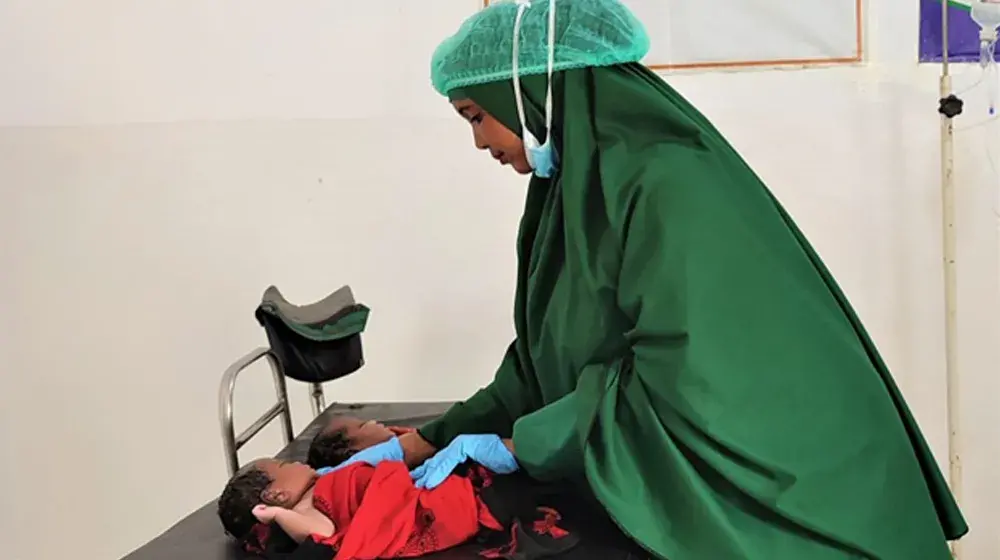Hinda Guled, 29, recently delivered a baby girl at Garowe General Hospital. Her husband, Farah, describes the delivery as a miracle because Hinda almost died giving birth. She was rushed to hospital by skilled birth attendants, who happened to have been in Taleh, carrying out an Integrated Community Reproductive Health Outreach Campaign for drought-affected populations in Sool region in the Puntland State of Somalia.
Hinda comes from Dhumay Valley, 30 kilometres outside Taleh town in Sool region, a hard-to reach area, which recently experienced effects of severe drought and inter-clan fighting. Most people in Dhumay Valley are poor, with little access to basic amenities. The severe drought, coupled with inter-clan fighting, made the situation even worse, especially for pregnant women and children.
“We thank God that Hinda and our new daughter are alive and healthy. I and other family members never thought Hinda would survive because she was so sick,” said Farah, adding: “I would also like to thank the outreach campaign team and Garowe Regional Hospital staff for saving the lives of my wife and our daughter.”
An obstetrician at Garowe Region Hospital Dr. Na’ima Abdirahman explained that Hinda was lucky that a team of medical experts was in the area when she faced complications with her pregnancy.
“Hinda almost died. She was very ill, anaemic and with very high blood pressure. She developed severe pre-eclampsia, was losing consciousness and she experienced life threatening seizures. Despite being so ill, Hinda was kept at home for two days without any medical care and this made her condition even worse,” said Dr. Abdirahman.
On July 7, 2016, a team of medical specialists comprising of obstetricians, midwives, and nurses arrived at Taleh, some 92 kilometers northeast of Garowe. The team was sent by the Ministry of Health to reach out to the drought-affected communities with focused ante-natal and post-natal care, treatment of minor reproductive health illnesses, screening and referral of gynaecological and obstretric complications, birth-spacing, distribution of dignity kits and prevention of mother to child transmission of HIV.
The team arrived a day after Hinda was rushed to Taleh Maternal and Child Health (MCH) Centre. Just two days earlier, Hinda was being looked after by traditional birth attendants in her village, who attempted to help her give birth but they failed to handle the health complications that Hinda developed.
“Hinda was very lucky that we were in Taleh at that particular time. We rushed her to Garowe Hospital because the MCH in Taleh is not supportive of complicated cases such as Hinda’s. Fortunately, we had an ambulance on stand-by during the outreach campaign to facilitate referral of complicated cases from the area,” explained Dr. Abdirahman.
On arrival in Garowe, Hinda was taken into the emergency room, prepared for a caesarian section and was able to deliver safely, according to Dr. Abdirahman. Hinda was provided with comprehensive maternity services including blood transfusion, treatment and postnatal care. “We kept her in hospital for two week for full recovery and now Hinda and her baby girl are healthy,” said Dr. Abdirahman.
The Integrated Community Reproductive Health Outreach Campaign is among the interventions supported by UNFPA through funds from the United Nations Central Emergency Response Funds (CERF) to reach the drought affected communities in Puntland regions namely Nugaal in Dangoryo, Karhis and Uskure and the region of Sool in Taleh, Turak and Bo’ame areas.
Up to 2,322 individuals accessed the services in Nugaal and Sool. UNFPA has also donated two ambulances and secured emergency reproductive health kits in support of the reproductive health campaign in the drought affected areas. The outreach campaign was also utilised to identify and register women and girls suffering from obstetric fistula to access fistula repairs and rehabilitation services during a fistula campaign, which will take place in Puntland from August 8 to August 12, 2016.
A recent inter agency monitoring of the drought in Puntland showed that drought affected areas in Nugaal and Sool regions are facing serious challenges related to access to maternal and reproductive health services, including limited availability of trained midwives and nurses in the remote villages resulting in their reliance on traditional birth attendants. Most of the obstetric complication cases are referred to Garowe or Laascaanood hospital. The average distance to the hospitals is 87 kilometres.
The Sool region is still experiencing the effects of the drought and continues to suffer frequent inter-clan conflicts, according to Sool Regional Health Officer Said Abdirahman.
“This region is totally underserved as most of the areas have no proper health facilities, have limited skilled health workers and little medical supplies. There is need for more attention to be given to this region to reduce suffering among the communities especially pregnant women and women of reproductive age,” said Abdrihman.
Taking into account these challenges, UNFPA Somalia prioritised and included integrated reproductive health outreach campaigns in the CERF project.
Reporting by Ridwaan Hassan Abdi
-------------------------------------------------------------
For more information please contact UNFPA Somalia Communications Specialist Pilirani Semu-Banda on e-mail: semu-banda@unfpa.com





